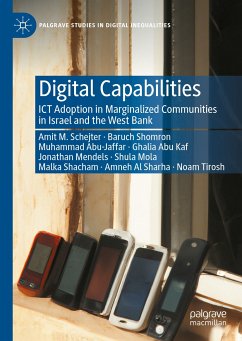¿Digital Capabilities is a first-of-its-kind exploration of the capabilities that communities in positions of inequality in Israel and the West Bank seek to realize by utilizing information and communication technologies (ICT), the opportunities they have to communicate, and the way ICTs serve their desire to do so. It is the outcome of an eight-year research project in which the nine authors of this book, some of whom came from within the studied communities, conducted their work among the studied populations over an extended period of time. The capabilities approach, much discussed theoretically, takes on a life in this project and is presented as an empirically observable phenomenon for assessing whether ICTs are serving actual needs, whether communication resources are justly allocated and distributed and whether they serve the goal of a universally accessible right to communicate.
Dieser Download kann aus rechtlichen Gründen nur mit Rechnungsadresse in A, B, BG, CY, CZ, D, DK, EW, E, FIN, F, GR, HR, H, IRL, I, LT, L, LR, M, NL, PL, P, R, S, SLO, SK ausgeliefert werden.









